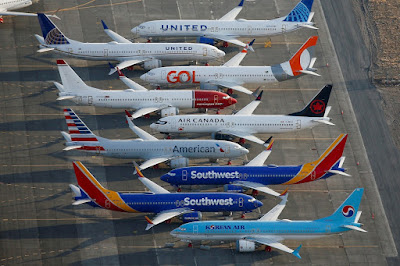The Airline Industry under Threat from the Coronavirus Pandemic
Of course, the title of this post is a little misleading in
that the airline industry is not the only industry facing extraordinary
pressure because of the global pandemic. However, it does provide an
interesting case study to show how the pandemic can affect an industry in a
number of different ways. Just some of those pressures will be discussed in
today’s post.
One of the first consequences to the airlines was the
detailing of a number of ‘ghost
flights’ taking place around a number of important hubs. These ghost
flights describe the process whereby an airline will fly an empty (or severely
reduced capacity) flight in order to maintain a specific slot in an airport’s
schedule. A number of slots on high-profile routes can be worth
tens-of-millions of dollars to an airline, and a massive secondary market
exists for such slots. However, under EU rules as just one example, an airline
must use 80% of these allocated slots or risk losing them to a competitor. As
the slots are particularly lucrative and important for the futures of a number
of airlines, it is more prudent to fly the planes from and into empty airport
slots, rather than lose that slot; this is irrespective of how long the decline
in consumer demand may last. The airlines, and a number of onlookers concerned
with the environmental impact, as well as other issues (such as increasing the
health risk to employees unnecessarily) complained about this and, earlier this
week, the EU
relaxed these rules on account of these concerns.
The measure is a temporary but required one because the industry
is coming under increasing pressure. A number of European hubs have been
closed, or airlines have reduced or stopped flights to certain places – Italy being
a prime example. In addition, President Trump recently declared a travel ban on a
number of European countries, with more likely to follow (the rumour at the
time of writing is that the
UK will soon be added to the list). Today, Jet2
turned flights around on their way to Spain, whilst Tui have cancelled a vast
number of flights between the UK and Spain, leaving travellers scrambling
for airports. The US airlines are continuing
to fly to Europe, if only to bring back employees and US citizens. However,
for other airlines the situations is more dire. Norwegian budget airline Norwegian
Air temporarily laid
off more than half of its staff and ground 65% of its flights. British
Airways, a stalwart of the international airline marketplace, has already
warned that jobs will be cut because of the pandemic, in a memo entitled ‘the
survival of British Airways’. It is almost certain that a US ban on British
flights will have a massive impact upon the fortunes of BA, even though its parent
company IAG is strong. The wider suggestion is that the industry could lose
up to £90 billion in revenue this year, and that is on the basis that the
pandemic subsides at some point this year, which is by no means guaranteed. On
top of this, the associated hotel and hospitality industry is suffering also,
with revenues
predicted to plummet this year. So, what may the industry look like in the
aftermath of the pandemic?
This pandemic is the worst-case scenario for the airline
industry. This is because flights will be the first thing to be considered as aggravating
the situation (as we have already seen), and then once the pandemic subsides
the return the skies will surely be gradual and people deem the risk to slowly
subside. So, the impact is immediate and the recovery will be gradual. If that
becomes the case, then a number of airlines will surely suffer. With such tight
profit margins anyway, the number of failures in this marketplace will surely
increase. If that is so, how will national governments respond? Will the
British government step in to save BA if it fails? One would imagine so. One
suggestion has been that airlines will instead seek to survive however they
can, and then raise
prices for good in order to both
consolidate their recovery and protect against future shocks. It will likely
then become a competitional or anti-trust issue, although whether the position
of consumers is prioritised over the stability of the industry will be
something worth watching. One thing is for sure, and that is that the industry
will likely not look the same when the planes return the skies as usual.
Keywords – airlines, planes, coronavirus, pandemic, @finregmatters





Comments
Post a Comment